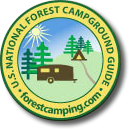Ecotourism – life blood for some
“Ecotourism” as defined by Michael Klesius, “is responsible travel to natural areas that conserve the environment and sustain the well-being of the local people.” He provided this definition in a September 2002 National Geographic article titled “State of the Planet.”
When I read the definition of “Ecotourism” images of the plains of Africa, mysterious jungles of the Amazon River, and other far away places came to mind. But you don’t have to take one step beyond the borders of our country to experience “Ecotourism” or be an “Ecotourist.” The link between tourism and our national forests, a.k.a. “Ecotourism”, has long been recognized in forest management, community develop, and tourism plans.
But what does “responsible travel” mean? In its most basic form, it’s those mantras we grew up with. “Only you can prevent forest fires,” from Smoky Bear and Woodsy Owl’s, “Give a hoot, don’t pollute.” Of course, there are plenty of way to expand these two phrases; use only biogradeable soap; plant a tree to celebrate a special event; eat local grown food stuff; and the list goes on. But, in their own way, a “responsible traveler” tries to “conserve the environment and sustain the well-being of the local people.
The tiny community of Jacob Lake (AZ), which is the closest thing to a town in this part of the Kaibab National Forest, is totally dependent on the magnificent beauty of the Grand Canyon and robust population of the wildlife found on the Kaibab Plateau. You can’t farm the land, the soil is too thin, rain too rare, and the growing season to short. Maybe you could run some cattle but that would be difficult, too. No, it is “Ecotourism” and the thousands of annual visitors, a.k.a. “Ecotourists” that keep this community afloat. And it is the “responsible traveler” that that keeps the area outstanding.
Ennis, Montana has the Gallatin, Beaverhead and Deerlodge national forests surrounding it but it’s the river that determines this small ranching community fortunes. Every winter, the local residents watch to snow fall on the mountains as the Madison River freezes. In the Spring they watch the temperatures as the snow melts and the Madison River start to flow again. The steady warming of temperatures melts snow, providing moisture to the land and water to the river and all is well. There is quality of fishing and hunting with the healthy forest. If the “Ecotourists” to the area do not practice “responsible travel” and cause damage to the “natural areas,” then ranching, fishing, hunting, hiking, and all recreation activities are degraded and “the environment” impacted.
I just learned that there is a group of ranchers here in the Madison Valley that offers people a “Ecotourists” experience. I’m told it’s not like one of the those Arizona chic resort ranches but a good old-fashion dude ranch experience. Interesting check with
Ennis, Montana Chamber of Commerce for more information.
Ennis and Jacob Lake are just two examples from our little sojourn where the concept of “Ecotourism” can be applied. You too can see and experience “Ecotourism” for yourself. Think of yourself not as a passing visitor to our national forests and their communities, but as an “Ecotourists” with a responsibility for “natural areas that conserve the environment and sustain the well-being of the local people.”


